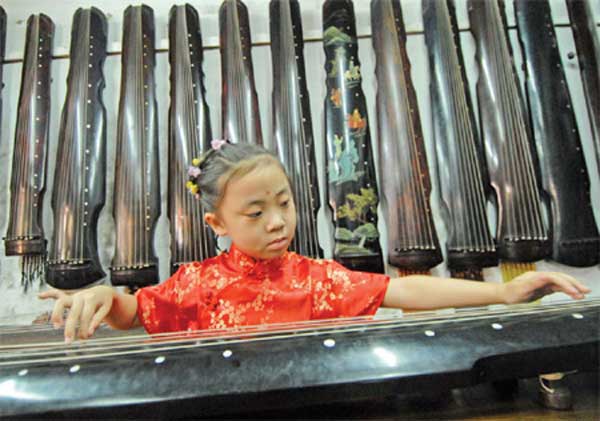Pulling heart strings
Updated: 2011-07-29 12:22
By Yan Yiqi (China Daily European Weekly)
 |
|
In 2003 UNESCO declared guqin music a world heritage treasure. In recent years antique guqin have fetched record prices at auctions. Provided to China Daily |
The 5,000-year-old guqin holds a special place for both european and Chinese music lovers
As incense fills the room, a girl dressed in a colorful Chinese costume sits in front of a Chinese zither, or guqin. With her fingers moving between the strings, gentle music fills the space, bringing peace, calm, and serenity.
This could be a scene inside a traditional household on Pingjiang Road in Suzhou, East China's Jiangsu province.
It could be an image taken from a classical Chinese painting.
But, this performance is happening in the heart of modern Europe.
The London Youlan Qin Society is considered one of the most active guqin societies in the West and has regular performances.
Founded in 2003, the society aims to "promote interest in and understanding of Chinese musical culture and philosophy, especially of the guqin in the UK".
According to the society, its summer school is the only one of its kind outside China to offer yearly tuition from guqin masters from China.
Guqin, also known as qixian qin, is a seven-stringed zither and is believed to be the oldest musical instrument in China. Early written records reveal it being used in the Shang Dynasty (c. 16th century-11th century BC) but some say it was played more than 5,000 years ago.
A common guqin is 120cm-125cm long - Chinese measurements 3 chi, 6 cun, 5 fen - symbolizing the 365 days of a year. The upper surface is round, representing the sky, while the bottom is flat, representing the ground.
Originally, a guqin had five strings, symbolizing the five basic elements of the universe: fire, earth, water, metal and wood.
The instrument experienced an evolution, and over the years two more strings were added.
"Among the four main elements of traditional Chinese culture - qin, chess, calligraphy and painting - qin ranks first because its music can express the feelings and thoughts that writings and paintings cannot tell," says guqin master Gui Shimin, who is the standing director of China Guqin Association.
The charm of guqin music has already attracted foreign musicians to China, according to Gui.
French jazz musician Jacques Mahieux and his son Nicolas Mahieux were his students and were eager to adapt the instrument's soothing sounds to their compositions.
"Maybe one day we can mix the music of guqin into our jazz music," says Jacques Mahieux to the local newspaper Nanjing Daily.
Gui, who is based in Nanjing, Jiangsu, says he has students from the UK, France, Germany, and the United States.
"Once a German couple came to me and we could only communicate through gestures," he says.
"They took guqin lessons for more than a year under this situation."
According to Gui, learning the guqin is difficult for Westerners because it is not merely about learning a new instrument, it is also acquiring Chinese culture.
"The musical score of guqin, for example, is very different from musical notation, which is widely adopted by Western instrument training," he says. "It is neither composed of notes, numerals nor letters of the alphabet. They are not simple Chinese characters either," says Gui, adding most Chinese people cannot read guqin scores.
The unique sound of the guqin is world famous and the instrument attracted a record auction price last year.
A rare Song Dynasty (960-1279) guqin was sold for 136.64 million yuan (15.54 million euros) at Beijing Poly's last autumn auction becoming the most expensive musical instrument ever auctioned anywhere. The phenomenon of record auction prices, however, worries some professionals of guqin.
"Nowadays, guqin's function is not as pure as it was in the ancient times. As well as regarding it as an instrument, people also add a material value on the guqin," says Yang Lumeng, founder and director of Guozixuan Guqin Conservatory.
Now in her early 30s, Yang started playing the guqin in 1998 and founded the conservatory in 2006.
"I have heard so many people complaining that guqin music is boring because they will easily fall asleep while listening to it," she says.
"But I would say people will fall asleep only when they are fully relaxed, and this is exactly how the guqin functions."
Yang was surprised when she heard that an ancient guqin was auctioned for more than 100 million yuan. "It is not that the instrument is not worth the price," she says.
"I am afraid more people will only focus on its material value and ignore its cultural importance."
In ancient times the guqin was traditionally favored by scholars and well-educated people as an instrument of great subtlety and refinement. In fact, a group of guqin players is called yaji, meaning elegant gathering.
"Our ancestors played the guqin to have a deeper understanding of themselves and Chinese culture. But many young people today are learning to play it only for obtaining the techniques to become so called masters," Yang says.
In China, the guqin is becoming more popular than ever with more students enrolling since 2003, when UNESCO proclaimed guqin music as one of the masterpieces of Oral and Intangible Heritage of Humanity.
However, instead of being happy, Gui feels concerned about the instrument's future.
"It is pathetic that such a great tradition of China is coming to the edge of extinction and Chinese people have to acquire our own culture through the recognition of an international organization," he says.
"Being proclaimed as oral and intangible heritage is not something to be proud of.
"Guqin deserves it. We should be proud when Chinese people have kept this culture generation to generation for another 3,000 years."
Gui has been giving guqin lessons in Nanjing for more than 10 years and his Wenyuan Guqin Society has about 100 students.
"I do not have certain criteria for receiving students," he says. "As long as they are willing to learn how to play the guqin, I'm willing to teach."
Gui's students range from 5 to 80-years-old. Their careers also vary from university professors to successful entrepreneurs.
"I require all my students to study calligraphy and Chinese painting as well. Chinese culture is not composed of some separated sections. They are a unit, and to understand one part, we have to know all other parts," he says.
Gui says that people should try to enjoy the culture and feelings behind the guqin music, not mechanically playing the instrument. "The core spirit of playing the guqin is to cultivate one's inner self."
E-paper

Double vision
Prosperous Hangzhou banks on creative energies to bridge traditional and modern sectors
Minding matters
A touch of glass
No longer going by the book
Specials

Ancient plate broken
An ancient porcelain plate was accidentally destroyed during a research in the Palace Museum.

Selfless actions
A 20-year-old girl becomes an Internet star for giving her first kiss to a drowning old man.

Space race
Homebuyers are learning the hard facts of supply and demand: too many cars and too few parking spaces.
